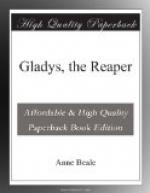’You may do what you like, Mr Prothero, for then I will have nothing to say to her. But go at once, and thank you very much.’
’I’ll go Swansea way, for I am sure they’ll take to the sea. Ach a fi! what’s gone to the young people.’
In less than a quarter of a hour Mr Prothero had mounted his best mare, and muttering a great many Welsh oaths, was soon riding in search of the fugitives. When he got out of his own immediate neighbourhood, he began to ask whether ’a tall, dark, young man, and a tall, pale, young ‘ooman’ had been seen.
‘Is it a couple of gipsies, Mr Prothero?’ asked a farmer, who lived about seven miles from Glanyravon. ’I did see a dark man, and a sallow ‘ooman go up the lane by now.’
‘Was the man like my son Owen?’
‘Well, I didn’t be seeing his face, but I shouldn’t wonder.’
Up the lane Mr Prothero went for a good half mile, and at last reached a gipsy encampment, where there were plenty of dark men, and sallow women, but not Owen and Gladys.
A shrewd old gipsy, seeing him evidently on the search for some one, assured him before he had asked any questions, that she had seen those whom he was looking for.
‘Where?’ asked the farmer.
‘Cross my hand with a silver coin, and I’ll tell ye,’ she said.
He gave her a shilling.
‘Young couple, my lord?’ asked the woman.
Mr Prothero nodded assent.
‘Dark and fair, yer honour?’
Another nod.
’I never tell secrets under a half-a-crown, but I have seen them, sir. Young man something like you, and handsome.’
‘Make haste and tell, you cheat and vagabond,’ said Mr Prothero, throwing her eighteenpence.
‘Up the first turning to the right, off the road, over the hill,’ said the woman.
‘When?’
‘An hour ago.’
Mr Prothero rode quickly down the lane, along the turnpike, up the first turning to the right, and then up a long and tedious hill.
It will be unnecessary to describe how Mr Prothero wandered over this hill for hours, without finding those he sought. As the said hill was a short cut to the road to Swansea, whither he was persuaded they were gone, it is not much to be wondered at that he was taken in, and that he went on as fast as his good horse would go for many a long mile; but he found neither Owen nor Gladys, and all his inquiries after them were fruitless.
Towards evening he returned home, tired and very cross, and found his good wife looking anxious and unhappy, and ready to say at any moment, ‘Dear, dear, how I do miss Gladys.’
A messenger from the Park was awaiting him, with a note from Miss Gwynne, inquiring whether he had found the poor girl or not. He was obliged to write a few respectful lines in reply, to inform her of the failure of his search.
‘I wish we had never set eyes on the girl,’ he muttered, as he was writing the note with much pains and some difficulty. ’To take off Owen, too, just as he was getting euseful, and he such a good writer and accountant.’




